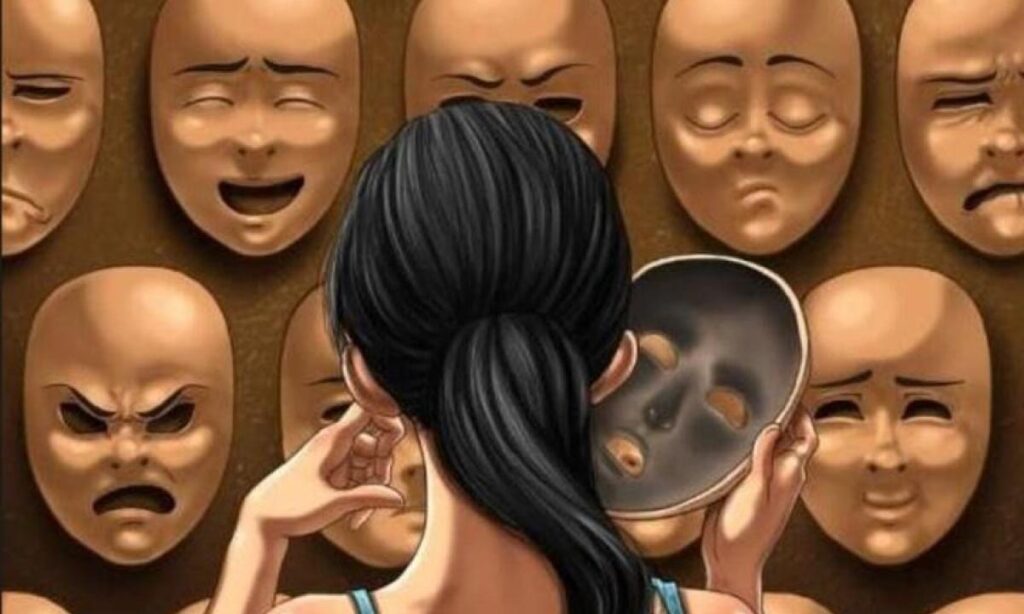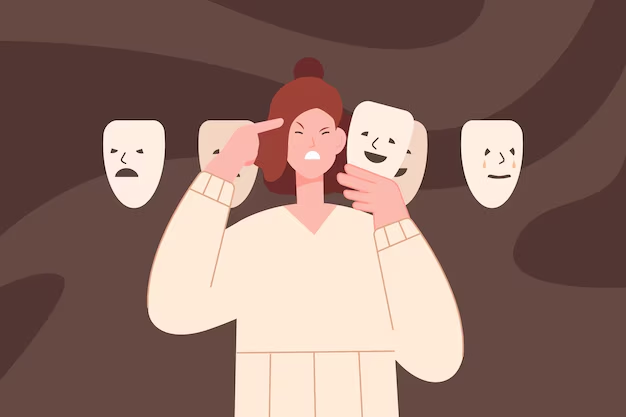
In a world where every interaction is influenced by social expectations and personal insecurities, we often find ourselves donning metaphorical masks to blend in or protect our inner selves. The masks we wear are not simply disguises but represent complex layers of defense mechanisms and identities crafted to help us navigate life’s emotional challenges and societal pressures. In this article, we explore the psychological roots of these masks, their impact on our relationships, and the transformative journey towards embracing our true selves. Backed by current research and psychological studies, we also offer practical strategies designed to help you peel back these layers, fostering personal growth and deeper connections.
The Psychology Behind Wearing Masks
The concept of wearing masks has long fascinated psychologists and researchers, as it encapsulates the delicate conflict between our inner world and external expressions. Our masks are complex layers of identity shaped by our upbringing, social interactions, and personal experiences. In modern psychology, these behaviors are seen as both protective mechanisms and barriers to authentic self-expression. Understanding these masks offers valuable insights into why we adjust our behavior in different settings and how these adaptations affect our mental health.
Recent studies in personality psychology emphasize that masks are not inherently negative; they are pragmatic tools developed over time. They enable individuals to navigate challenging social landscapes where certain traits are either rewarded or penalized. For example, showing resilience and optimism in difficult situations may hide underlying sadness or anxiety. This dual nature of masks makes them a fascinating subject for psychological inquiry, revealing both adaptive strengths and vulnerabilities.
Furthermore, in the digital age the way masks are presented has evolved. Online, the carefully curated identities on social media are modern-day masks that highlight socially desirable traits while concealing the complexities of our inner lives. As we decode these layers through psychological insights, it becomes evident that these masks are not simply false representations but rather multifaceted instruments of survival and self-expression.
Social Expectations and the Construction of Identity

Social expectations significantly influence the formation of our personal masks. From childhood, the need to fit in with peers and meet familial or cultural standards shapes our behaviors. As we mature, these influences reinforce personality traits that might not fully reflect our inner truths but are crucial for social acceptance. The construction of identity is deeply entwined with external pressures, leading to masks that both protect us and sometimes restrict our emotional expression.
The conflict between personal aspirations and external demands often creates internal tension. For instance, someone might adopt an upbeat persona at work to meet professional expectations while privately struggling with feelings of inadequacy or stress. This gap between the real self and the socially accepted mask can result in identity confusion, chronic stress, and even depression over time.
Moreover, cultural narratives play an essential role in dictating which masks we adopt. Different societies emphasize various traits—such as stoicism in some Eastern cultures or exuberance in Western ones—thus encouraging conformity to these idealized images. Although these masks can be adaptive, they may also hinder the emotional growth necessary for genuine self-acceptance.
The Role of Early Socialization
From birth, our family, education, and media act as socialization agents that shape our understanding of acceptable behavior. These early influences establish interaction templates, prioritizing conformity over authenticity.
Early experiences, both positive and negative, plant responses that later emerge as masks—essential defense mechanisms helping us navigate complex social environments.
Media and the Idealized Self
In today’s digital era, media crafts powerful narratives about what a ‘perfect life’ entails, fueling the desire to create an idealized self-image.
Social media platforms amplify these ideals as individuals filter and edit their lives for public consumption, often resulting in a continuous performance rather than genuine self-expression.
Interpersonal Relationships and Hidden Realities

Interpersonal relationships serve as a dynamic arena where our masks and authentic selves often interact. Masks can help manage relational dynamics by preventing conflicts and smoothing social interactions. However, when these masks become too rigid, they can hinder authentic connection and prevent true intimacy from developing. The challenge lies in balancing social decorum with honest self-disclosure.
In many relationships—romantic, platonic, or familial—we tend to reveal only those aspects of ourselves that align with the expectations of others, often neglecting our deeper emotions. This selective sharing can evolve into what is known as ‘emotional labor,’ where sustaining the mask becomes increasingly exhausting. Authenticity in relationships is a delicate balance that requires vulnerability, trust, and open communication.
Therapists recommend that acknowledging these hidden layers is key to maintaining healthy relationships. When both parties commit to authenticity by openly discussing fears and vulnerabilities, true intimacy and mutual understanding can flourish. Often, a few small, honest conversations can be the starting point for deeper transformational changes in how we connect.
Pathways to Authenticity and Psychological Growth
Achieving authenticity is a gradual process that embraces self-reflection, acceptance, and continuous personal evolution. This section delves into practical strategies for those ready to peel back their protective layers and embrace a more genuine self. Overcoming the habit of masking is not instantaneous—it requires perseverance, introspection, and often, professional guidance.
Cognitive-behavioral techniques, mindfulness practices, and therapeutic interventions can help individuals distinguish between genuine self-expression and constructed defenses. Recognizing that masks are adaptive responses rather than fixed identities is the first step on the journey toward psychological growth and improved well-being.

A recurring theme in psychological research is the strong link between authenticity and emotional resilience. When we allow ourselves to express genuine thoughts and feelings, we not only feel more empowered but also build stronger, more empathetic relationships. Psychological growth becomes a personal triumph with collective benefits, enriching both our inner lives and the ways we connect with others.
Mindfulness and Self-Awareness
Mindfulness practices help us monitor our thoughts non-judgmentally, clarifying which emotions truly belong to us.
By staying present, we learn to notice when we are resorting to masking behaviors, making it easier to respond more authentically.
Therapeutic Interventions
Professional counseling is a vital resource for uncovering the origins of our masks and developing healthier coping strategies.
Approaches like cognitive-behavioral therapy (CBT) provide structured methods to challenge and reframe the negative beliefs that sustain these defenses.
Integrative Approaches and Future Perspectives

This final section explores integrative approaches that blend traditional psychological methods with innovative practices such as digital detoxes, expressive arts, and community engagement. It recognizes that our masks are multifaceted, and addressing them requires a holistic understanding of the individual. Integrative strategies aim to bridge the gap between our emotional inner world and the external pressures of society.
Modern psychology is shifting toward a multidisciplinary approach, merging insights from neuroscience, behavioral science, and technology. For example, digital platforms now play an important role in raising mental health awareness by encouraging honest narratives over curated images. This evolution reflects a growing recognition of the value of transparency and self-compassion in mental health.
Looking to the future, emerging perspectives in psychology suggest that integrating various therapeutic models will lead to more personalized and effective ways of unmasking. With ongoing research and technological advancements, there is hope that societal norms and clinical practices will evolve to prioritize authenticity over conformity. In our ever-changing world, embracing our true selves is not only a personal act of liberation but also a transformative step for collective mental well-being.
Technology and Mental Health
Digital innovations can simultaneously obscure and reveal our true selves. New apps and platforms create spaces for mental health support that emphasize real connections and genuine storytelling.
When used mindfully, these digital tools complement traditional therapeutic practices by fostering communities that celebrate authenticity.
Community Engagement and Support
Participating in support groups and community initiatives offers both social connection and shared experiences, vital for the journey toward authenticity.
Community engagement reinforces the idea that vulnerability and genuine self-expression can empower and unite us in unexpected ways.
Content Additional
Beyond the in-depth analysis presented above, it is important to consider the wider cultural implications of wearing masks. In recent decades, globalization and rapid technological evolution have accelerated the ways in which our personal identities are shaped and reshaped by external influences. This era highlights the importance of seeking authenticity as societal pressures—from career demands to social media portrayals—add layers of complexity to our self-expression.

Modern psychological theories suggest that although the masks we wear can be sources of strength by helping us gain acceptance, they may also hinder our ability to experience true emotional fulfillment. Breaking free from these patterns demands a commitment to self-exploration and the courage to confront uncomfortable truths. Today, embracing vulnerability is increasingly recognized as an act of strength rather than a weakness.
Research indicates that as our personal narratives become more complex, the effort required to maintain these masks also increases. The constant juggling of multiple identities can lead to inner turmoil that manifests as stress-related illnesses. Techniques such as journaling, meditation, and expressive writing have proven effective in reducing this internal conflict and fostering a more unified sense of self.
It is essential to remember that the journey toward authenticity is not linear, and setbacks are a natural part of the process. Recognizing small victories along the way and celebrating incremental progress can empower individuals on their path to self-acceptance. By honoring our true selves and accepting the complexity of our inner worlds, we lay the groundwork for greater mental resilience and sustainable personal growth.
When we reflect on the crucial role that masks play in our daily lives, it becomes clear that understanding these psychological defenses is essential for embracing our authentic selves. Recognizing the interplay between societal expectations and personal identity paves the way for more genuine relationships and heightened self-awareness. Ultimately, the journey toward authenticity isn’t about discarding every protective layer overnight but about gradually integrating our true selves with the defenses needed to navigate a complex world. Embracing vulnerability and authenticity redefines how we relate to ourselves and others, paving the way for a more balanced, fulfilling life.




